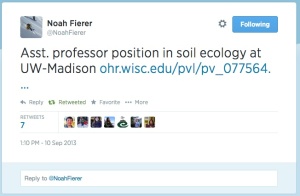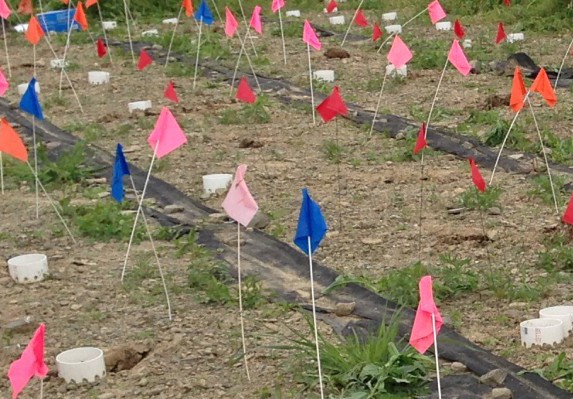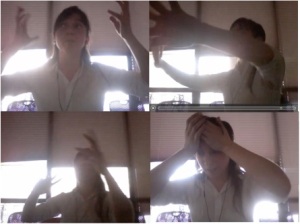This summer, I accepted a tenure-track faculty position as a soil ecologist at the University of Wisconsin – Madison. I wasn’t exactly sure what to expect as I entered the job market, but found lots of helpful resources online. In particular, various posts and resources from Inside Higher Ed, Prof-Like Substance, Female Science Professor, the Chronicle of Higher Ed, The Professor is In, and Dynamic Ecology, along with discussions with Josh Neufeld, my committee, and other department members, were especially useful for me. In an effort to do my part, I am going to add my own experience to the ether, hopefully to be of use to some people.
(Warning: this post is awfully long, and may be not so interesting if you’re not directly interested in the academic job process. Another caveat – I would like to say that this account is simply of my own specific experience. There is lots of information out there describing how capricious, frustrating, and opaque the academic job market / hiring process can be, and there are absolutely lots of amazing, talented, hard-working scientists out there who “deserve” to have this job or a similar one as much as I do. I am extremely grateful that I have been so fortunate with my experience with this process and recognize that there are many factors, sources of support, and privileges that contributed to my ultimate success.)
The Application

That fateful Tweet
I actually found out about this position last fall from a Twitter post by my current academic crush, Noah Fierer (so thanks, Noah!). I re-tweeted it immediately, and while reading through the job description, I just felt this excited feeling – this was exactly the type of job I would a) want and b) be qualified for. I wasn’t necessarily thinking of applying for professorships yet, because I hadn’t even finished my Ph.D. (When I was home, I was talking about applying for postdocs after my Ph.D., and my mum asked me whether I wouldn’t apply directly for professorships, and at the time I just laughed because it seemed so unlikely.) However, I figured that I might as well give this job a shot, for a few reasons. First, the applicant pool for this position was going to be my direct competition for almost any job I’d want, so it might be good to get a sense for where I sat in that field of applicants, and whether I might be competitive. Second, I was going to need to develop these materials – teaching statement, research statement, CV, cover letter – at some point, so any work I put into them now wouldn’t be a waste of time, even though I was pretty busy trying to finish my Ph.D. work.
It was interesting to me to have to actively step back from my narrowed Ph.D. field of view to think about the broader arcs of research that I was interested in pursuing in the future. Sure, I could easily list the next steps or experiments I’d like to run based on my current Ph.D. research, but I needed a bigger vision for my research statement. I ended up with a set of documents I felt happy with, all of which included an emphasis on why this particular school, department, and position were appealing to me, and sent it off to the committee, recognizing that was likely the end of the process for me.
The Phone Interview
A couple months later, I was thrilled to get the message that the committee was interested in interviewing me! I was not so thrilled that it was going to be on the phone – not even Skype – meaning it would likely be extremely awkward. At least with Skype you can see people’s reactions to some extent. With the phone, I would be just talking into the void, potentially blathering on without realizing it, and without a clue whether the committee were rolling their eyes at each other, or listening intently and nodding. They told me it would be a 15 minute interview, in which they would ask all candidates the same four questions. To prepare, I re-read and printed out my application materials so I would have them handy for reference in the interview. The evening before, I spent a couple of hours working through sets of sample interview questions I found online, actually answering them out loud, talking to myself on my couch. I figured with four questions I had a pretty good idea what they would ask – probably broadly about my future research directions, my teaching plans/philosophy, my lab/mentoring/advising approach, and maybe why I was interested in the position/department/school. I was half right – two questions were about research and teaching, but the other two were a surprise ! In particular, the request to “characterize soil diversity in space and time,” was definitely not something I had prepared for! I think I actually laughed on the phone, and said, “Good question,” because it was pretty out there, and then just did my best to begin to get into the vast and crazy heterogeneity that soil scientists love/hate. Even though I knew it’d be painful to look at, I recorded my side of the conversation using Photobooth on my computer, so I could go back and critique myself and improve for next time. This actually helped, because the whole thing was a bit of a whirlwind. Watching the video afterward, I was kind of glad it wasn’t on Skype after all – I am apparently kind of a crazy hand-waver while talking. My main critiques were that I said “I guess” more than I’d like, did some uptalking?, and felt like I kind of fumbled a description of my teaching philosophy, getting lost in the middle of it. Again, I assumed that was probably the end of it, and the next time would go better.
The Visit
I missed the call when my phone rang about 10 days later with a Wisconsin area code because I was in the lab, but when I saw the number, I was very excited. They wanted to invite me to the campus for an in-person interview, and offered 5 dates, which I assumed meant they had 5 candidates, which seemed like a relatively high number. I ended up with the middle date, which I felt wasn’t particularly advantageous or disadvantageous (except for the fact that I’d been hoping for a later one so I’d be further along with my Ph.D. research). The search committee sent me a schedule for the visit before I came, which I went through, researching each person I was going to meet with, and writing down notes and questions I had for each of them on a different page in my notebook. I also made lists of questions for the graduate students, the deans, the departmental chair, and general questions for anyone who would listen. I wrote down all my potential future funding sources. I re-read my application documents again. I researched the school, thinking about who I would want to collaborate with, and which institutions or groups I wanted to know more about. I had to give a research talk on my first day and a mock teaching lecture on my second day. I practiced both of these in front of my labmates, professors, and other friends, who gave me tons of helpful feedback.
The visit was a whirlwind of meetings, meals, and coffees, but overall it was actually pretty fun! People kept on asking me if I was totally wiped out or overloaded, and while it was quite a busy schedule, it was mostly just interesting and exciting. There is lots of intriguing research going on at the school, across departments, and everyone I met with was friendly and welcoming. When I left two days later, I felt like I had done my best, although I also had a feeling that I didn’t get the job – I’m not sure why – maybe I just felt like there should be more grilling or intense discussions – except for the seminars and the search committee meeting, for the most part it was friendly discussion of science, the school, and the city in general. I was worried that maybe they were giving me an easier time because of my status as a Ph.D. student. However, afterward, my advisor said this wasn’t likely the case – when you are visiting as an interview candidate, they want to make you feel welcome, in case they do decide to offer you the position, rather than really put you through your paces and make you feel like you have something to prove.
I think one thing that helped me at least enjoy the visit was that it was easy to relax and be myself while I was there. Because I already had plans for an awesome postdoc for the next couple of years and had generally low expectations about getting the position as a Ph.D. student, I wasn’t too anxious about the visit, and was mostly seeing it as a useful learning opportunity. This relaxed attitude was established almost immediately on my first day there – the search committee chair picked me up from the airport, and suggested we grab lunch. This threw me off a little bit, because it wasn’t on the schedule, so I had been envisioning a low-key afternoon alone before the interview day, planning to do some more prep work and maybe practice my research seminar more. I thought to myself, “The interview begins now.” We went to a cool place near the Capitol, where, of course, being Wisconsin, there were, like, four different cheese plates on the menu. I love cheese, and told the committee chair this, so he said we should definitely order a plate. When I ordered it, the server said, “I’m sorry, but I’m not sure if we have one of those cheeses available right now – I’ll check with the kitchen and let you know.” I said helpfully, “That’s no problem – feel free to substitute it with another one.” The server left and then I turned and stared at the committee chair and said in a kind of crazy intense voice, “I WANT THAT CHEESE,” which would be the sort of joke I would normally make with friends, but maybe was not quite the professional tone I had intended to set? After the meal I texted my friend, “Well, I guess I’m taking the ‘be yourself’ route!”
I think this was actually good, though – that’s just the kind of person I am, and the faculty probably wanted to know what I would be like as a colleague. Similarly, I am obviously a younger woman scientist. On the second full interview day, I could have tried to dress conservatively and seriously in order to try to counteract a potential impression of me as frivolous/inexperienced , but instead, I decided to wear a bright coloured dress that I love with heavy tights, a cardigan, a big metal necklace, and boots. I figured I was not going to fool anyone into thinking I am an old male researcher, so I might as well just express myself, hoping those characteristics were actually a strength.
Why me?The dynamics of a job search are pretty opaque to those on the outside, and the factors that lead to success are probably pretty different from one search to the next. In my case, though, I think three factors probably helped – fit, potential, and enthusiasm.
Fit: Throughout my time at Cornell, whenever a job announcement came across my desk, I would ask myself, “Is this the sort of position I might want?” and, “Will I be qualified for this position in X years?” This helped me check in throughout my degree to make sure that I was developing the skills and expertise that I would need in the future. For example, I made an active shift during my Ph.D. to improve my microbial ecology skills, majorly supported by the courses at the MBL in Woods Hole and my committee member, Dr. Dan Buckley. My background in soil science was also part of being a good fit. My M.S. and Ph.D. are both in soil science, I consider myself foremost a soil scientist – not someone who just happens to do some of my research in soil systems, and one of the things that attracted me to the position was that the department was a true Soil Science department. As I said in my cover letter, part of my fascination with soils lies in their complexity: soil science is a field where effective collaborations are not only important, but almost essential. The strong soil science department at UW-Madison is a very attractive aspect of the position for me – a strong, integrated soil science department is well poised to address today’s and future challenges. I applied to this position largely because it felt like the perfect position for me – it is much less likely that I would have been successful if the search had been broader – say, for an “environmental scientist” – with a broader pool of applicants.
Potential: Because I am not very far along in my research career, the committee had to judge my potential based on a relatively short record. I am very pro doing a Master’s degree before a Ph.D. (material for another post), and in my case, I am sure it only helped me. I published 5 articles during my M.S., and actually only had one published Ph.D. paper on my C.V. at the time of my application. If I hadn’t had to wrap up a complete research project 4 years ago, then I might not have been so productive over the past 6 years of grad school.
Enthusiasm: Basically, I love teaching and I love soil ecology. I’m excited to talk to anyone about soils (one night in Toronto my brother overheard someone on a streetcar ranting loudly to a stranger about how crazy soils are… it turned out to be me), and I think that comes across pretty readily.
The Offer
I knew the committee and department were deliberating and had a meeting scheduled for the end of the week after the last candidate’s interview, so when my phone rang that afternoon, my heart leapt! I almost couldn’t believe it when Doug told me I was the committee’s first choice. It was thrilling, humbling, and scary! Since then, it’s been an exciting few months of negotiations (material for another post?), visiting for a second time, and thinking about my long-term plans, all while finishing my Ph.D. I am so so excited about this job, and can’t wait to begin. My new mantra is “I want that cheese!” and I will be looking for graduate students starting in January 2016, so get in touch!


